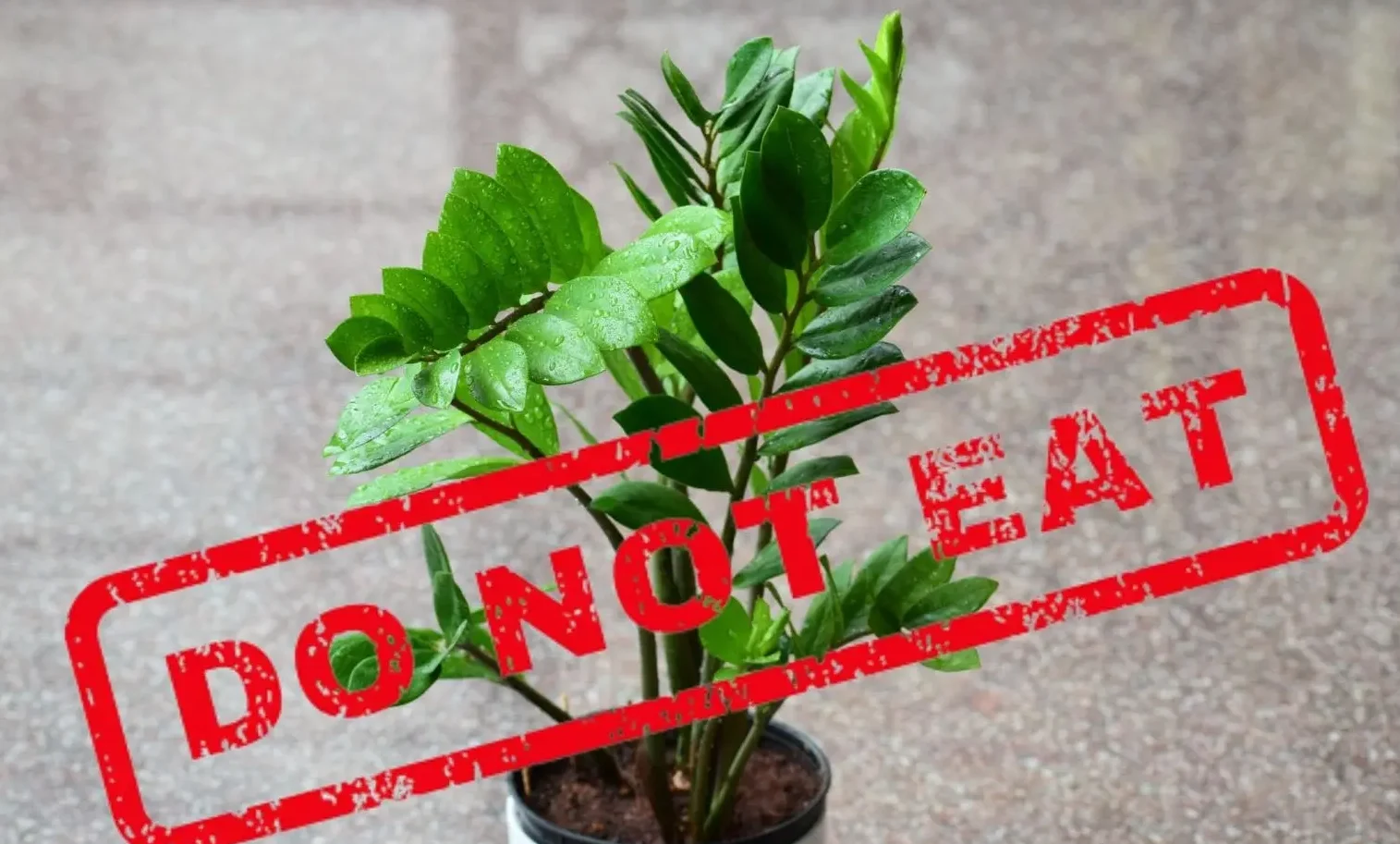As a houseplant, the Zamioculcas zamifolia, or “ZZ plant,” has become increasingly popular in recent years.
With its glossy leaves and striking appearance, the Zee Zee plant adds a unique touch to any home or office.
But is this exotic-looking houseplant safe? Are the ZZ plants poisonous?

Is ZZ Plant Poisonous for Pets and Humans?
The short answer is yes, some parts of the ZZ plant are potentially toxic if ingested. The primary toxic agent within these plants is calcium oxalate crystals.
These microscopic needle-like crystals can cause extreme pain and irritation if ingested, resulting in swelling of the tongue and throat, difficulty breathing, vomiting, and intense burning sensations.
Fortunately, calcium oxalate poisoning from ingestion of a ZZ plant is quite rare due to their tough foliage and bitter taste that discourage animals and humans from consuming them.
However, it’s important to be aware that pets can be especially susceptible to ingesting plants due to their curious nature.
Dogs, cats, and other small animals may be tempted to chew on the leaves of a ZZ plant or even consume them entirely which could result in severe reactions such as choking or respiratory distress.
If you suspect your pet has ingested any portion of this plant it’s important to contact your vet immediately for medical assistance.
In addition to potential ingestion risks associated with pets, humans should also take caution when handling a ZZ Plant as contact with their leaves or stems can cause skin irritation in some people due to an allergenic reaction caused by tiny hairs on the surface of the foliage.
Those with sensitive skin types should wear gloves when handling one of these plants or opt for another type of houseplant instead if they have particularly sensitive skin types.
You can read the details: ZZ Plant Causes Cancer – A Detailed Analysis.
Additional Info
Overall while it’s true that some parts of a ZZ Plant are potentially toxic if ingested, they pose a minimal risk under normal conditions due to their bitter taste which usually deters both humans and animals from consuming them.
In terms of contact risks with skin, however, it’s always best to handle these plants with gloves just in case you are allergic or have particularly sensitive skin types due to tiny hairs located on the surface of the leaves which may cause an allergic reaction in some individuals.
You can also read about variegated and black ZZ plants.
Conclusion
The ZZ Plant is known to contain toxic substances that can cause extreme pain, swelling of the tongue and throat, difficulty breathing, vomiting, and intense burning sensations if ingested.
Additionally, contact with their leaves or stems can also cause skin irritation in some people due to an allergenic reaction caused by tiny hairs on the surface of the foliage.
In order to avoid potential poisoning from a ZZ plant, it’s best to keep it out of the reach of pets or small children and wear gloves when handling it.
It is also important to contact your vet immediately if you suspect your pet has ingested any portion of this plant.
Finally, be sure to research other common houseplants that may not pose as much of a risk for potential poisoning.
Related FAQs:
Are ZZ plants really poisonous?
Yes, ZZ plants contain calcium oxalate crystals which can be toxic if ingested, causing various symptoms such as pain, swelling, difficulty breathing, and vomiting.
How toxic are ZZ plants to pets?
While ZZ plants have a bitter taste that usually deters pets from consuming them, ingestion can still lead to severe reactions in animals. It’s crucial to keep ZZ plants out of reach of pets and seek veterinary assistance if ingestion is suspected.
Can ZZ plants cause skin irritation?
Yes, ZZ plants can cause skin irritation in some individuals due to tiny hairs on the leaves and stems. It’s advisable to wear gloves when handling ZZ plants, especially for those with sensitive skin.
What should I do if my pet ingests a ZZ plant?
If you suspect your pet has ingested any part of a ZZ plant, contact your veterinarian immediately for medical assistance. Prompt action can help minimize potential harm to your pet.
Are there any alternatives to ZZ plants that are safer for pets?
Yes, there are many houseplants that are considered safer for pets, such as spider plants, Boston ferns, and certain types of palms. Researching pet-friendly houseplants can help you choose alternatives to ZZ plants if you have concerns about pet safety.
What are the symptoms of ZZ plant poisoning in humans?
Symptoms of ZZ plant poisoning in humans may include extreme pain and irritation in the mouth and throat, swelling, difficulty breathing, vomiting, and intense burning sensations. In severe cases, medical attention may be required.
Can ZZ plants cause long-term health problems?
While ZZ plants can cause acute poisoning if ingested, there’s limited evidence to suggest long-term health problems from exposure to these plants. However, it’s essential to exercise caution and seek medical advice if poisoning occurs.
How can I prevent ZZ plant poisoning?
To prevent ZZ plant poisoning, keep the plant out of reach of pets and children. Educate family members about the potential dangers of ingesting or handling the plant. Consider wearing gloves when handling ZZ plants to avoid skin irritation.
Are ZZ plants safe to keep indoors?
Despite their toxicity, ZZ plants are commonly kept indoors as houseplants. With proper precautions, such as keeping them out of reach of pets and children and wearing gloves when handling, ZZ plants can be safely enjoyed indoors.
Are there any benefits to having ZZ plants despite their toxicity?
ZZ plants are prized for their low maintenance and air-purifying qualities, which can improve indoor air quality. While precautions should be taken due to their toxicity, many people find ZZ plants to be a beautiful and beneficial addition to their indoor spaces.
What should I do if I experience skin irritation after handling a ZZ plant?
If you experience skin irritation after handling a ZZ plant, immediately wash the affected area with soap and water. If the irritation persists or worsens, seek medical advice. Applying a soothing cream or anti-inflammatory lotion may also help alleviate symptoms.
Can ZZ plants be safely kept in homes with children?
While ZZ plants can be kept in homes with children, it’s essential to place them out of reach to prevent accidental ingestion. Educate children about the potential dangers of consuming or handling ZZ plants, and supervise them around the plant if necessary.
Are ZZ plants safe for outdoor gardens?
ZZ plants are typically grown as indoor houseplants, but they can also be cultivated in outdoor gardens in suitable climates. However, if planting ZZ plants outdoors, ensure they are placed away from areas accessible to pets and children to prevent accidental ingestion.
Do ZZ plants require special care to minimize their toxicity?
ZZ plants don’t require any special care to minimize their toxicity beyond basic precautions such as keeping them out of reach of pets and children and wearing gloves when handling. Regular maintenance, such as pruning dead or damaged foliage, can also help reduce the risk of accidental ingestion.
Are there any safe methods for deterring pets from chewing on ZZ plants?
There are several methods for deterring pets from chewing on ZZ plants, including using bitter-tasting sprays or deterrents specifically designed for plants, placing physical barriers around the plant, or providing alternative chew toys or plants that are safe for pets to consume.
Are ZZ Plants Poisonous to Cats and Dogs?
Yes, some parts of the ZZ plant are potentially toxic if ingested by cats and dogs. Ingesting this plant can cause extreme pain, swelling of the tongue and throat, difficulty breathing, vomiting, and intense burning sensations. If you suspect your pet has consumed any part of the ZZ plant it’s important to contact your vet immediately for medical assistance.
Is there an antidote for ZZ Plant Poisoning?
There is no known antidote for ZZ Plant Poisoning, so it’s important to contact your vet immediately if you suspect your pet has ingested any portion of this plant. Furthermore, individuals should take caution when handling a ZZ Plant as contact with their leaves or stems can cause skin irritation due to an allergenic reaction caused by tiny hairs on the surface of the foliage. Those with sensitive skin types should wear gloves when handling one of these plants.
Is there an antidote for ZZ Plant Poisoning?
There is no known antidote for ZZ Plant Poisoning, so it’s important to contact your vet immediately if you suspect your pet has ingested any portion of this plant. Furthermore, individuals should take caution when handling a ZZ Plant as contact with their leaves or stems can cause skin irritation due to an allergenic reaction caused by tiny hairs on the surface of the foliage. Those with sensitive skin types should wear gloves when handling one of these plants.
Can ZZ plants be harmful if pollen is inhaled?
While ZZ plants do produce pollen, they are not typically known to release significant amounts of airborne pollen. However, individuals with pollen allergies or sensitivities may experience mild respiratory symptoms if exposed to ZZ plant pollen. Keeping the plant well-maintained and placing it in well-ventilated areas can help minimize pollen exposure.
Are there any specific precautions to take when repotting ZZ plants?
When repotting ZZ plants, it’s advisable to wear gloves to protect your skin from potential irritation. Additionally, avoid touching your face or eyes while handling the plant, and wash your hands thoroughly after repotting to remove any plant residue.
Can ZZ plants cause harm to aquarium fish if their leaves are submerged in water?
ZZ plants are not aquatic plants and should not be submerged in water. If ZZ plant leaves come into contact with aquarium water, they may release toxins that could harm fish or other aquatic life. It’s best to keep ZZ plants out of aquariums and other water sources to prevent potential contamination.
Are ZZ plants safe for use in terrariums or enclosed planters?
ZZ plants can be used in terrariums or enclosed planters, but it’s essential to ensure adequate ventilation to prevent the buildup of stagnant air, which could potentially exacerbate any respiratory irritation caused by the plant. Monitor the health of the plants and occupants of the enclosed space regularly.
Can ZZ plants cause harm to outdoor wildlife if grown in gardens or outdoor spaces?
While ZZ plants are primarily grown indoors, they can be cultivated in outdoor gardens in suitable climates. However, it’s essential to prevent access to ZZ plants by wildlife to avoid potential ingestion and poisoning. Erecting physical barriers or using deterrents can help protect ZZ plants and wildlife.

